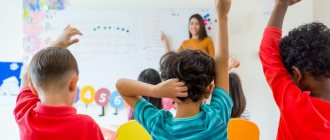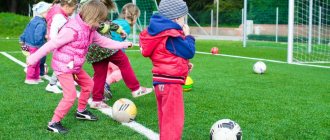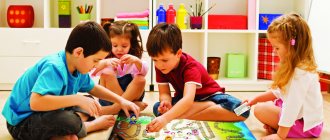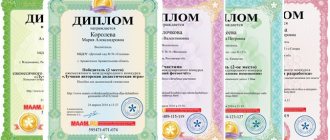The first thing that was done was an examination using the ECERS-R scale at preschool sites where teacher training was planned. We were guided by the Federal State Educational Standard for preschool education, and this gave us an idea of what kind of teacher is needed today. But it was important to study it continuously and at the same time answer the questions: what kind of teacher is today, what does he possess, what professional difficulties does he experience, what values characterize him? It is also necessary to understand what his personal and professional needs are. Only by meaningfully comparing what it should be with what it is now, we were able to understand what would be the content of the educational program for educators. The study revealed problem areas in their activities. For example, all kindergartens received only 2.9 points for the design of space in groups.
Experts noted a very weak visual, informative, and textual design of the environment; there were few interesting play centers in the groups, the space for games was inconveniently zoned, and exhibitions of children’s works were more for parents than for children.
The second is working with the values of the kindergarten and the teacher himself. It is important to create conditions for the emergence of a single semantic field and the acceptance of the values of preschool childhood: acceptance (support for the diversity of childhood; preservation of the uniqueness and intrinsic value of childhood as an important stage in the overall development of a person, the intrinsic value of childhood - understanding (considering) childhood as a period of life that is significant in itself, without any conditions; significant because of what is happening to the child now, and not because this period is a period of preparation for the next period; respect for the child’s personality At this stage, a situation of trust is formed among teachers in those who teach them, which is the main motivation for effective learning.
Third, trainings that take place actively. Educators not only gain knowledge, they discover themselves through drawing, interactivity, play, theater, and mastering new technologies in their activities. And the best way to “feel” it is in the process of its development and reflection.
The fourth is supervision (a form of consultation during the work of a teacher in a group, which allows you to see, realize, understand and reflectively relate to your professional actions), another discovery of the effective development of technology by teachers.
Supervision allows you to do more than just see how educators put into practice the technologies they studied during the training.
They receive feedback from an expert, analyzing problematic situations together here and now.
Fifth, this is an internship test, when a teacher can try on someone else’s pedagogical technology in the kindergarten where the internship takes place.
Sixth is reflection, which takes place after each training, supervision, and internship.
On February 21, a seminar “Development Management in Preschool Education” was held, in which educators and experts participated. They discussed the results of the work and further prospects for the implementation of projects in the Troitsky and Novomoskovsky districts of Moscow.
It has become clearly visible (including in numbers) that the point of no return has been passed and many preschool sites demonstrate a very good level.
If four years ago the overall situation was very average - 3.3 points according to ECERS, now it is a strong 4-5-6 points.
Moreover, this can be said based not on the expertise of an external expert, but on an honest self-assessment (this is also an important step!).
The following important aspects of work remain in the zone of proximal development:
Formation of communicative competencies, including in communication with parents.
The issues of correctly arguing one’s position, building a dialogue both with parents and with colleagues at other sites, with school teachers, etc. are still relevant.
Flexible planning.
Despite the fact that some playgrounds are already developing their own models of flexible plans, children are no longer highly organized when everything is clear and according to plan. However, some preschool sites have their own “distortions” in one direction or another: either “life from children” is built, but educational tasks and work in the zone of proximal development suffer, or, on the contrary, the plan takes over and there is a lack of free activity and games. This is a very important and fragile balance and a lot of work.
Working with rules, children's independence and subjectivity.
We observe that rules have emerged in almost all sites. They were created by the hands of children, and this is important. But there are nuances. How independent are children in following rules? Or are the rules still the prerogative of adults, even though they were drawn by children? And how are things going with independence in the garden?
For example, some Montessori practices include much more self-care skills: children iron their own towels, wash their plates, etc.
And can the rules concern feelings and the freedom to express them in children or just behavior? What if children offer a “don't get angry” or “don't get upset” rule? How to deal with this? These are all important issues to discuss.
Development of an educational environment on outdoor playgrounds.
In many complexes, areas are still assigned to a separate group, although a walk is a rare time for children of different ages to interact. Gross motor equipment is also not always age-appropriate, multi-skill, and does not provide the risk-taking required for children to explore their abilities.
For example, a “balancer” develops balancing skills, and elements of a sports complex, such as stairs, a horizontal bar, a rope, a climbing wall, a slide, develop dexterity, the ability to control one’s body, etc.
The presence of such equipment of varying levels of complexity gives the child a kind of “challenge”, inviting him to develop bodily capabilities, comprehending ever new spaces.
This also applies to physical education classes. There is room to move.
Personal development of a teacher.
Each team in this field may have its own development trajectories. At some sites, there is a demand for the development of critical thinking, when you need to analyze yourself and your practice more deeply and clearly, bring ideas and findings to a more meaningful level, etc. Somewhere, on the contrary, a situation arises with the need to live feelings more deeply and allow oneself to be inactive, when it is difficult for a very active and active team to stop and “breathe”, not run, “be with it” and look at everything with a fresh look.
We are like children. If we don't take a break, neither will they.
This is work based on individual requests and programs. Deeper focus on problems. Absolutely, there is no individualization in children without individualization in adults. After all, only when adults have their own experience of individualized learning, they learn to hear themselves, accept their needs and feelings, not be afraid of different worldviews, their own and other people’s characteristics - then true individualization in relation to children becomes possible.
Spread good practices inside and outside the complex.
In our work on internship sites, we came to the conclusion that teachers are afraid to face the resistance of colleagues who do not work according to the Federal State Educational Standard; they immediately want to devalue themselves, modestly say, “that this is just our experience,” etc.
In fact, working with resistance, as well as building a training or internship program, are separate skills; there are many technological techniques that can be learned and applied.
So there is room to grow and at the same time there is already something to share.






